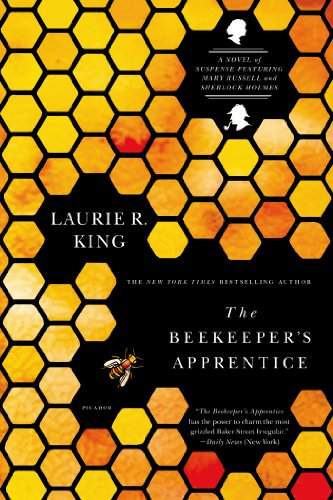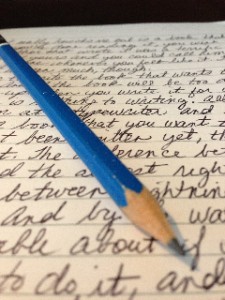Another of my favorite authors is Laurie R. King. Her Sherlock Holmes and Mary Russel stories are set just after the Great War and I love all the historical and geographical details she drops into the books.

In these stories, Holmes has met his match in his young protege Miss Russell, whose mind rivals his own. The two team up for several mysteries before … well, I won’t spoil the surprise. Suffice to say it’s a logical decision.
I’m rereading the stories because Ms. King has a new book coming out very soon, wherein Holmes and Russell travel to Transylvania. Should be a fun read! I love the lyrical language in the books. Ms. King really knows how to turn a phrase. I’d love to learn how to do that — my characters tend to be wisecrackers who’d rather let go with a snarky comment than a poignant line.
If you like historical mystery novels, especially if they feature Sherlock Holmes, Dr. Watson, Mycroft — and of course Mrs. Hudson! — you should read these books. I’m off to reread my favorite sections again…
I saw a list of interview questions for authors the other day and one of the questions was “What genre do you secretly wish you could write and why don’t you?”

If I could do it, I’d like to write mystery stories. I like reading them (and watching them on film or television). I like trying to figure out “whodunnit” before the end of the book. But I don’t write it.
What’s stoping me? All the bloody red herrings, that’s what. My mind just doesn’t work like Agatha Christie’s or Arthur Conan Doyle’s. I start with a perfectly good idea, then can’t think of any clues for the investigator to follow. I guess I’m just not sneaky enough–or maybe I’m too sneaky and what seems obvious to me might not be that obvious to a reader. Whatever the reason, I can’t seem to get the clues lined up and tossed along the trail.
I’m reading a nice mystery story now: Still Life by Louise Penny. It’s the first in a series about Inspector Gamache, a Canadian policeman. So far, I’m enjoying it. The characters–both police and suspects–are all quirky and interesting. The reason for the murder is suitably inexplicable (as yet). It looks as if they’ve found the murder weapon–but I’m only about halfway through the book so I’m sure there’s some twist in their findings. The inspector will realize they forgot something essential and off he’ll go …
I’m also working on a series by Harry Bingham of Jericho Writers. His heroine is called Fiona Griffiths and she’s a UK policeman who has suffered from a rare psychological condition where she thought she was dead (it’s a real condition). This gives her a quirky, skewed outlook on life which makes the books interesting.
And yes, I do read several books at once. Sometimes, I’ll hit upon a story that I just have to rush right through and finish at once (The Ten Thousand Doors of January). Mostly, I read a little bit here, a little bit there, whatever I’m in the mood for when I have a few minutes of free time. I might have two or three mystery tales, a historical romance (guilty pleasure), some science fiction, and maybe even a contemporary novel or two. My moods change frequently, so I have to have something interesting in my Kindle at all times.
Perhaps in the future, I can figure out how mystery writing works. For now, I’ll stick to historical fiction where all I have to do is research the time period and put in enough action for my lads.
I like to “watch” something while I’m working — and by “watch” I mean put it on in the background and listen while I’m writing.

This show was based on the popular mystery series by Kathy Reichs. Forensic anthropologist Temperance Brennon (called “Bones” by her partner) solves crimes with the help of FBI agent Seeley Booth. They’re assisted by a cast of quirky characters from the Jeffersonian and the FBI. In addition to the individual show’s arc (which was resolved in sixty minutes), the show also had several series’ arcs with stories about serial killers who were after various members of the team at various times.
I have to admit, Bones was interesting enough to have me shifting tabs now and then to see what the characters were up to … I like mystery shows and quirky characters, so this one was a good fit for my interests. It’s hardly historical, but an author does not live on genre alone.
Unraveling the Mystery of Mysteries, by Chantelle Aimee Osman
“A first class mystery is also a first class novel.” ~P.D.James
There are three main elements to a mystery:
- Plot – This is more important in a mystery. Know at least the key points before starting: who/what/where/why? Always start 20 pages after where you THINK it should begin!
- Make sure you have some subplots – romance, etc. Of course, the crime is most important – and it’s not always murder.
- Introduce the crime within the first 3 chapters. Make it believable – do your research. The methods used need to be rational and scientific, and the method of murder should match the killer.
- Clues should be almost invisible. The best ones point in one way but actually say something different if you look at it the right way. You really only need 1-3 really important clues. It’s more the plot and characters.
- You may have heard that “False clues and red herrings are not fair” – baloney! Life’s not fair. Don’t go too far afield with your clues, though – keep them realistic to your world.
- Also -remember that everyone has a secret, so everyone might be guilty.
- Characters – introduce the protagonist and antagonist early. The reader should have some sort of emotional attachment – either like them or hate them.
- Look up the FBI Profile Worksheet and fill it out for your characters – then leave most of that off the page!
- Make sure you actually like your characters!
- Your sleuth should be as unique as possible.
- Backstory should be like bread crumbs – drop a trail instead of dumping everything in the first book.
- Explaining motivation is bad, too – show us action or dialogue.
- Setting – This is often what draws people to the book. Treat setting as another character – don’t adjust it to just to have a place to set the story. Use things and places readers aren’t likely to see, but be accurate.
Also remember: anything that is going to make you jump or jar you out of the story is bad – it’s like bad narration in a movie.
5 Traits of a Highly Successful Writer (William Lavender)
- Confidence in your ability.
- Passion about your work.
- Have a willingness to change.
- Don’t give up when you fail.
- Continue your education.
Like, Love and Lust (Alison Sky Richards):
Reasons someone might not attempt a relationship:
- fearful of losing a friend
- fearful that their feelings won’t be reciprocated
- in another relationship
- uncertain of their own sexual orientation
In a good relationship, the other person completes them in some way:
- Yin and Yang
- Opposites attract
- Similarities
The break-up point is when trust has been broken; the other must re-earn that trust to repair the relationship
“Falling in Love”
- Star-crossed lovers
- Unrequited love
- Love triangles
- Marriage of convenience
- High school sweethearts who meet years later
- Summer flings
- Rich Girl/Poor Boy
- Outcasts
- Instinctual (werewolves, vamps, etc)
- Florence Nightingale
- Finding love when no longer looking for it
When someone is in love:
- they exaggerate their partner’s characteristics (rose-colored glasses)
- they see them as holding important values
- they feel happier/ more hopeful
- they love themselves more
- they feel more attractive and desirable
- they maintain the idealization of “falling in love,” but have a clearer understanding of friends in love
- they make commitments they normally wouldn’t make
- they may not be as jealous of partners (if the relationship is healthy)
- they feel less lonely and isolated
- partners in a healthy relationship learn to tolerate being separated and learn to tolerate intimacy and vulnerability
Barriers that keep a relationship from progressing:
- a checklist of “must-haves”
- wants sex only
- wants love only
- too high an expectation of partner
- fear of change
- putting something else above the relationship
The Joy of Writing Sex (Elizabeth Benedict) – 10 Principles:
- A sex scene is not an instruction manual.
- A good sex scene doesn’t have to be about good sex.
- It’s OK to be aroused by your own writing.
- Your fear is your best friend.
- Sex is nice, but character is your destiny.
- Only your characters know for sure what terms they’ll use.
- Take your cues from your characters.
- Make sure the emotions leading into sex make sense.
- A good sex scene is always about sex and something else.
- Who the characters are to one another is key.

